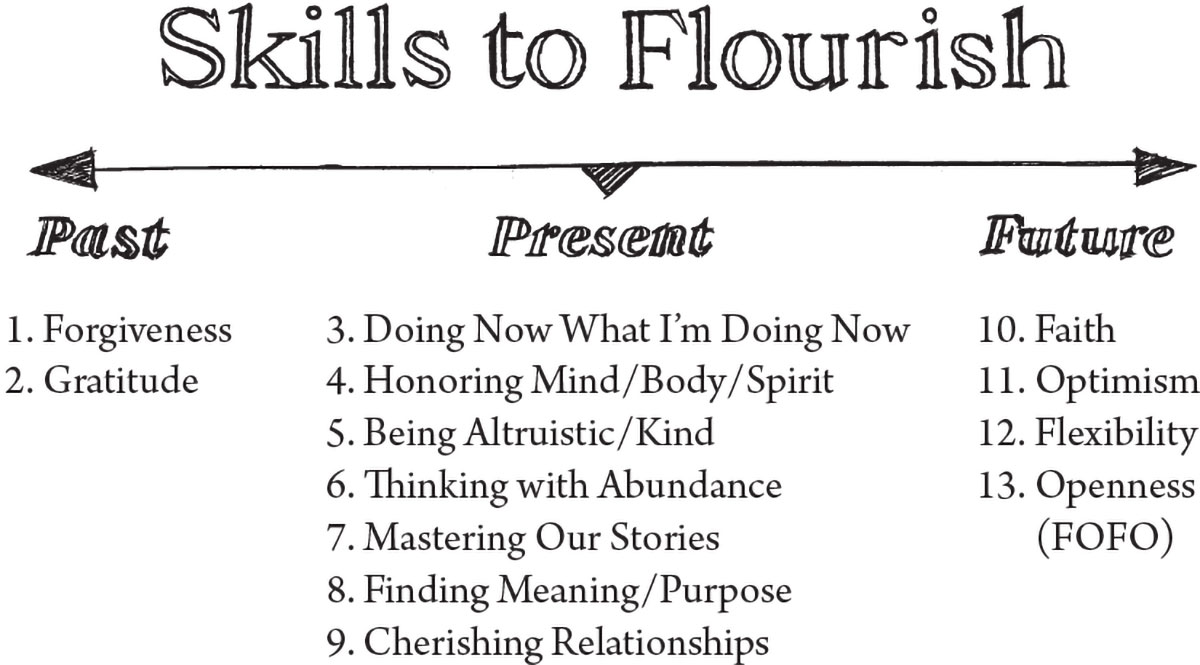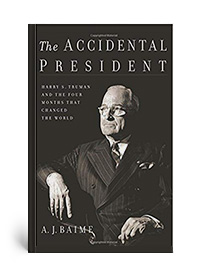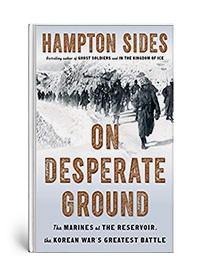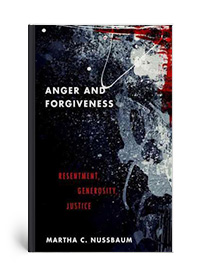Friends,
Welcome to my eighth quarterly newsletter.
In this newsletter I want to address the skill of forgiveness, since most all of us struggle with this skill and also because it may be the most important of the 13 skills that lead to happiness, or what positive psychologists call “flourishing.” (Positive psychologists have moved away from the term “happiness” to “flourishing” and so have I in these newsletters.)
THE MODEL
To refresh your memory, the model we use is based on the belief that people who flourish have a unique perspective about three things:
- They remember the past with peace. Whatever hurts they have experienced or caused, they have learned from it and let it go. They do not carry around a lot of anger or remorse about the past.
- They have confidence in the future. As they look to the future, they know they have a role to play in preparing for the future. They also know they cannot control the future and that the future will most assuredly be different from exactly what they have expected. Therefore, those who flourish focus on their role and are willing to accept whatever merry diversions the future brings.
- Finally, with peace about the past and confidence in the future, they are then able to live in the present rather than being pulled into the past with anger/remorse or into the future with fear/trepidation.
Here is the model of the 13 skills that enable us to gain these perspectives:

FORGIVENESS
The two skills that lead to peace with the past are forgiveness and gratitude. I will deal with forgiveness in this newsletter and address gratitude in the next.
The past does not really exist. Our only access to it is through our memories. What we carry in our memories, how we choose to remember the past, has a profound effect on our present and our ability to flourish.
If you are like me, most likely you have carried around with you negative things about the past, often the very distant past, that limit our ability to live with joy in the present. You may not have thought about forgiveness as a skill, but it is a skill; in fact, it is two very distinct skills … forgiveness of self and forgiveness of others. The first is a skill about releasing the desire for vengeance and the second is a skill of self-esteem. Both are essential to having peace with the past. Let’s look at each separately.
FORGIVENESS OF OTHERS
When we struggle with forgiving others we are experiencing anger and a desire for revenge. Why do we hold on to the hurts others have caused us or we perceive they have caused us? We do this for three reasons. We do this because we have the mistaken feeling that by not forgiving this will right the wrong. It doesn’t, it has no effect on the wrong that has been perpetrated. We also hold on to anger in an attempt to reduce the status of the perpetrator, to have others think less of the person. Here again, this serves no legitimate purpose. Finally, we hold on to the anger in order to bring it all back at some future date and manipulate the person … “You remember when you did this to me six months ago!” This too serves no useful purpose and undermines our friendships. When we carry anger, it harms us far more than the person toward whom it is directed.
Now most of us are pretty good at what is called “transactional forgiveness,” or where the perpetrator has apologized and we have become the victor as opposed to the victim. What is considerably more difficult is practicing “unconditional forgiveness,” or forgiveness where the other person feels no remorse about what they have done and has not apologized. This is a skill that is unique, but one that is at the core of flourishing. The daughter of the minister killed by Dylann Roof in a church in Charleston, SC captured unconditional forgiveness. At Dylann Roof’s arraignment, she said: “You cannot have my joy. It is not yours to take. I forgive you. I hope God will have mercy on you.” If we are to have peace with the past, we must be able to forgive unconditionally, for without it our ability to flourish is bound up with the very person who has offended us.
FORGIVENESS OF SELF
The other skill of forgiveness is forgiveness of self. When we knowingly do someone else an injustice or cause another harm, we naturally feel remorse for having done so. This sense of remorse has a useful purpose. Remorse has us contemplate the hurt we have caused, seek to rectify it and not repeat it in the future. But for many of us, we continue to not forgive ourselves and carry this remorse long after the remorse has served its purpose … long after we have rectified our behavior. Psychologists refer to this residual remorse as “dirty pain” for it serves no useful purpose and limits our ability to experience joy.
Forgiveness of self is a skill of self-esteem. Self-esteem is two things; it is the sense that I am confident I can face the future and the sense that I am worthy of happiness. When we correct our behavior and then forgive ourselves, we are practicing self-esteem in that we are demonstrating our worthiness of forgiveness … our worthiness of happiness.
HOW TO PRACTICE FORGIVENESS
I want to share just one tool for forgiveness. It is from Everett Worthington who is probably considered one of our top experts on the subject of forgiveness. It is called the “REACH” process.
When you are seeking to forgive someone else or yourself, you may want to follow these five steps:
- RECALL: Recall the incident.
- EMPATHIZE: Seek to empathize with the person we are trying to forgive, ourselves or someone else.
- ALTRUISTIC GIFT: Give yourself or others the altruistic gift of forgiveness.
- COMMIT: Take some action to show your commitment to forgiving. Write the person a letter, call them, write yourself a note of forgiveness.
- HOLD-ON: Most likely the sense of remorse or anger will return and when it does remind yourself that you have forgiven and seek to hold on to the sense of forgiveness.*
*Source: Forgiving and Reconciling: Bridges to Wholeness & Hope, Everett L. Worthington
For those who can’t forgive, either themselves or others, time does not move forward but consistently circles back to the past, to a painful time where either you harmed someone else or someone harmed you. It doesn’t serve us well. Anger and remorse corrode the vessel in which it is contained.
I struggle with the skill of forgiveness and my guess is, so do most of my readers. There are only four things we can do with hurts from the past:
- We can forget them … great if it happens,
- We can repress them … they always come back in insidious ways,
- We can hold on to them … what most of us do to our own detriment, or
- We can forgive … the choice that leads to a flourishing life.
Forgiveness is the only voluntary choice we have to successfully deal with hurts from the past. The practice of forgiveness, both transactional and unconditional, both of ourselves and others is critical to living with joy.
Thanks for reading. Be well … in fact, flourish!

–Douglas. A. Smith
“You only have to forgive once. To resent, you have to do it all day, every day, all the time, you have to remember the bad things over and over. It’s too much work.”
–M. L. Stedman, The Light Between the Oceans
From the bookshelf!
Books I am reading and highly recommend.



